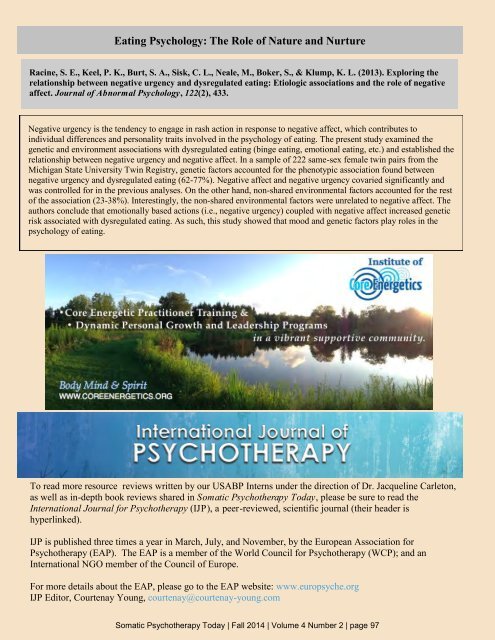SPT-Fall2014
SPT-Fall2014
SPT-Fall2014
You also want an ePaper? Increase the reach of your titles
YUMPU automatically turns print PDFs into web optimized ePapers that Google loves.
Eating Psychology: The Role of Nature and Nurture<br />
Racine, S. E., Keel, P. K., Burt, S. A., Sisk, C. L., Neale, M., Boker, S., & Klump, K. L. (2013). Exploring the<br />
relationship between negative urgency and dysregulated eating: Etiologic associations and the role of negative<br />
affect. Journal of Abnormal Psychology, 122(2), 433.<br />
Negative urgency is the tendency to engage in rash action in response to negative affect, which contributes to<br />
individual differences and personality traits involved in the psychology of eating. The present study examined the<br />
genetic and environment associations with dysregulated eating (binge eating, emotional eating, etc.) and established the<br />
relationship between negative urgency and negative affect. In a sample of 222 same-sex female twin pairs from the<br />
Michigan State University Twin Registry, genetic factors accounted for the phenotypic association found between<br />
negative urgency and dysregulated eating (62-77%). Negative affect and negative urgency covaried significantly and<br />
was controlled for in the previous analyses. On the other hand, non-shared environmental factors accounted for the rest<br />
of the association (23-38%). Interestingly, the non-shared environmental factors were unrelated to negative affect. The<br />
authors conclude that emotionally based actions (i.e., negative urgency) coupled with negative affect increased genetic<br />
risk associated with dysregulated eating. As such, this study showed that mood and genetic factors play roles in the<br />
psychology of eating.<br />
To read more resource reviews written by our USABP Interns under the direction of Dr. Jacqueline Carleton,<br />
as well as in-depth book reviews shared in Somatic Psychotherapy Today, please be sure to read the<br />
International Journal for Psychotherapy (IJP), a peer-reviewed, scientific journal (their header is<br />
hyperlinked).<br />
IJP is published three times a year in March, July, and November, by the European Association for<br />
Psychotherapy (EAP). The EAP is a member of the World Council for Psychotherapy (WCP); and an<br />
International NGO member of the Council of Europe.<br />
For more details about the EAP, please go to the EAP website: www.europsyche.org<br />
IJP Editor, Courtenay Young, courtenay@courtenay-young.com<br />
Somatic Psychotherapy Today | Fall 2014 | Volume 4 Number 2 | page 97


